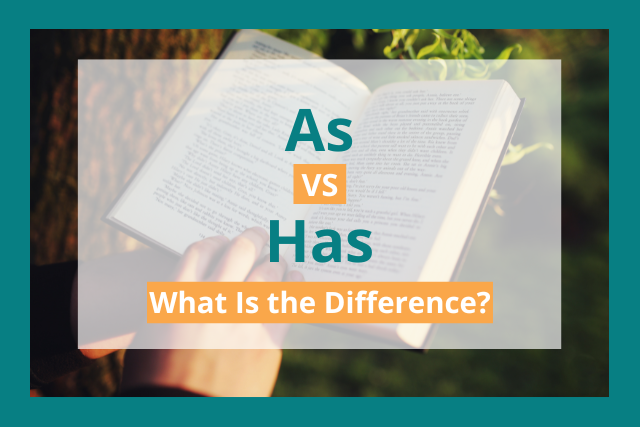
The words as and has are often confused because they are easy to mistype. We'll help you to understand the difference.
As means like or in the capacity of when used as a preposition.
As is also used as an adverb. It means to such an extent or degree.
Has means the present tense third-person singular form of have when used as a verb.
A good way to remember the difference is He HAS hamburgers--these all start with H.
Out of the two words, 'as' is the most common. It appears about three times more frequently than 'has'.
The Difference Between Has vs As
As and has are easy to mistype and misuse because they look similar. Here are the differences.
As has many meanings and functions as several parts of speech. As a conjunction, it functions similarly to like or in the capacity as.
When used as a preposition, as means in the condition or role of (she works as a teacher). As can also be an adverb that means to the same degree or amount. These are just a few uses of as.
Has is the third-person singular form of the verb have in the present tense.
Which is right ', as well as' or ', has well has'?
The correct expression is ', as well as'. These phrases are often confused because they look similar.
Is the right expression 'as well as the' or 'has well has the'?
The correct expression is 'as well as the'. These phrases are often confused because they have a similar spelling.
Is the expression 'as a result of' or 'has a result of'?
The correct expression is 'as a result of'. These phrases are often confused because they look similar.
Should I use ', it has been' or ', it as been'?
The right phrase is ', it has been'. These phrases are often confused because they are easy to mistype.
Should I use 'has nothing to do' or 'as nothing to do'?
The right phrase is 'has nothing to do'. These phrases are often confused because they appear similar.
Which is correct 'has been shown to' or 'as been shown to'?
The correct expression is 'has been shown to'. These phrases are often confused because they appear similar.
Should I use 'there has been a' or 'there as been a'?
You should use 'there has been a'. These phrases are often confused because they have a similar spelling.
Should I use ', which has been' or ', which as been'?
You should use ', which has been'. These phrases are often confused because they look similar.
Some synonyms of as are: equally, like, while, because, whereas.
Some synonyms of has are: acquires, accepts, owns, experiences, accepts.

